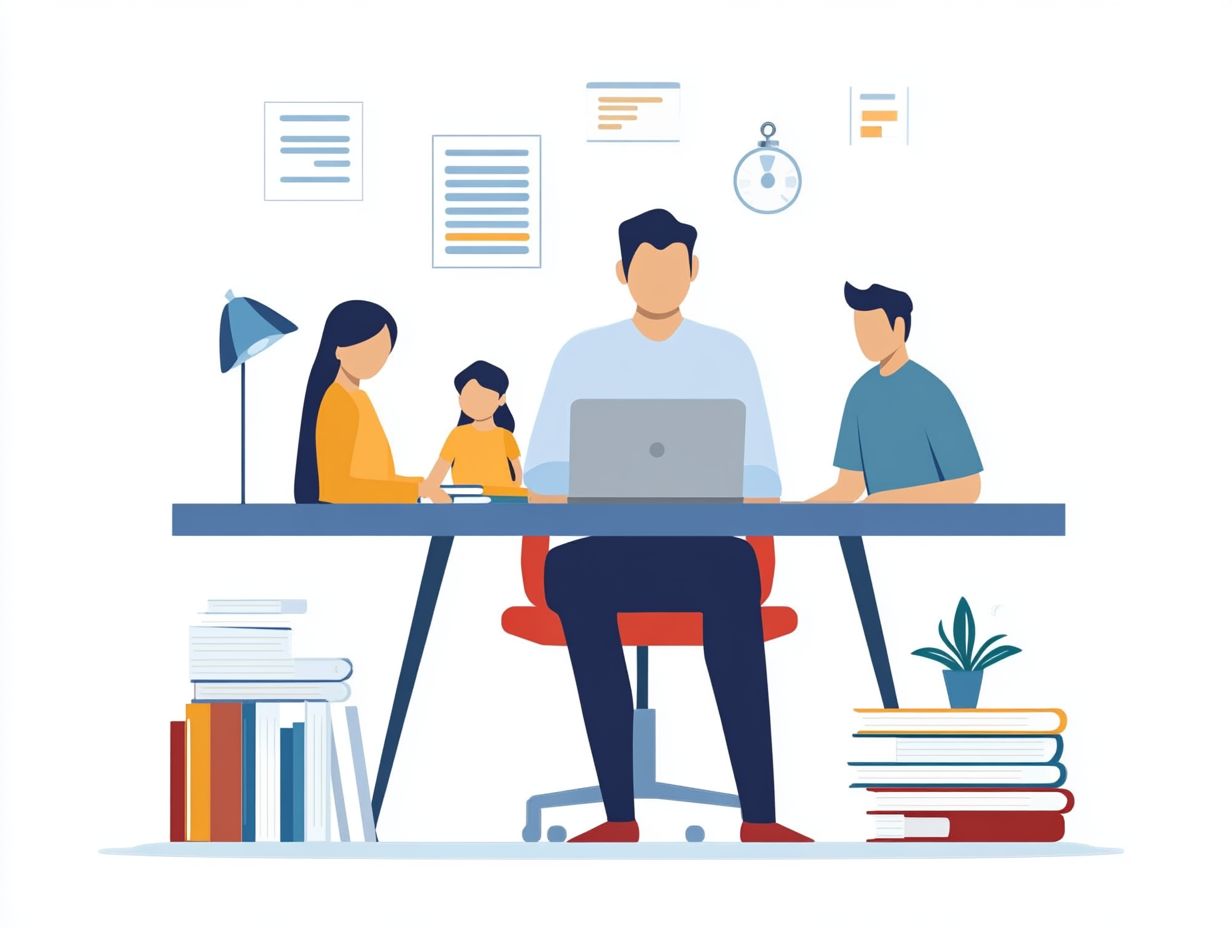How to Maintain Work-Life Balance During Crises
In today’s fast-paced world, achieving a harmonious work-life balance can feel like a monumental task, especially during times of crisis. This exploration delves into the concept of work-life balance and sheds light on the distinct challenges that arise in stressful situations.
You ll uncover practical strategies for effective time management, setting priorities, and nurturing your mental well-being. From self-care practices to leveraging support systems and negotiating with your employers, this guide equips you with the tools necessary to navigate this complex landscape and cultivate a healthier, more balanced life.
Contents
- Key Takeaways:
- Understanding Work-Life Balance
- Challenges to Work-Life Balance During Crises
- Strategies for Maintaining Work-Life Balance
- Maintaining Mental and Emotional Well-being
- Seeking Support and Flexibility
- Frequently Asked Questions
- 1. How can I maintain work-life balance during a crisis?
- 2. What are some practical ways to balance work and life during a crisis?
- 3. How can I manage the stress of maintaining work-life balance during a crisis?
- 4. Is it okay to prioritize work over personal life during a crisis?
- 5. What are some warning signs that my work-life balance is off during a crisis?
- 6. How can I communicate my work-life balance needs to my employer during a crisis?
Key Takeaways:

- Prioritize self-care and mental well-being to maintain work-life balance during crises.
- Utilize effective time management techniques and set boundaries to manage work and personal life demands.
- Seek support and flexibility from employers and use available resources to navigate challenges during crises.
Understanding Work-Life Balance
Grasping the concept of work-life balance is essential for your well-being and the success of any organization, especially in today s fast-paced environment where balancing personal responsibilities and work commitments can feel like a high-wire act.
Achieving a healthy work-life balance enhances your productivity and mitigates the risk of burnout, which is the feeling of being overwhelmed and exhausted from work. It ensures that mental health support and stress management strategies are woven into the fabric of workplace culture.
Flexible work arrangements are becoming more common, so it’s vital to establish communication strategies that nurture both professional relationships and personal time, enabling you to navigate the complexities of daily life with greater ease.
Defining Work-Life Balance
Work-life balance represents the seamless integration of your personal responsibilities and professional obligations, allowing you to prioritize your mental health while nurturing fulfilling professional relationships.
This equilibrium promotes emotional well-being and boosts your productivity at work. Key components of achieving this balance include mastering time management, setting clear boundaries, and cultivating a supportive environment that encourages flexibility.
When you can adeptly navigate both your career and personal life, you often find yourself experiencing lower stress levels and heightened job satisfaction.
Striking this balance can also strengthen your family bonds and enrich your social connections, underscoring the importance of recognizing the intricate relationship between your career ambitions and personal aspirations.
Challenges to Work-Life Balance During Crises
During crises like the Covid-19 pandemic, you encounter substantial challenges in maintaining a work-life balance. Work crises often intertwine with personal crises, leading to increased levels of burnout and chronic stress.
You may feel emotionally exhausted from these overlapping pressures, calling for effective coping strategies that tackle immediate concerns and foster long-term resilience and mental well-being.
Identifying Common Challenges
Identifying common challenges to work-life balance reveals factors like employee burnout, chronic stress, and the complexities arising from both work-related crises and personal issues, all of which contribute to significant emotional exhaustion.
These challenges stem from heavy workloads and tight deadlines, creating a cycle of pressure that can feel suffocating. You might find it difficult to compartmentalize your professional responsibilities from your personal life, leading to blurred boundaries that diminish your ability to unwind and recharge.
A lack of flexible work options and insufficient support from management can heighten feelings of isolation and inadequacy. As these stressors accumulate, they profoundly affect your emotional well-being, making it increasingly challenging to achieve any semblance of balance in your life.
Strategies for Maintaining Work-Life Balance

To maintain a harmonious work-life balance, it s essential for you to implement effective strategies such as time management, workload management, and task prioritization. These practices enable you to allocate your time efficiently between professional responsibilities and personal interests.
Incorporating self-care techniques and developing robust communication skills, along with embracing flexible work arrangements, can significantly elevate your capacity to navigate daily challenges while safeguarding your mental health.
Effective Time Management Techniques
Effective time management techniques, such as task prioritization and workload management, can elevate your productivity. Tools like the Eisenhower Matrix and various project management platforms provide excellent frameworks for organizing tasks based on urgency and importance.
By integrating these methods into your daily routine, you can craft a structured approach to your workload that minimizes stress. For instance, the Pomodoro Technique a time management method that breaks work into intervals allows you to engage in focused bursts of work, followed by brief breaks, leading to sustained concentration and energy.
Utilizing digital planners or apps can further streamline your scheduling, helping you visualize deadlines and commitments. As these practices become second nature, you’ll find they help you meet work demands while freeing up time for your personal life and nurturing relationships.
Setting Boundaries and Priorities
Setting boundaries and priorities is crucial for achieving that elusive work-life balance you desire. By doing so, you can manage your personal responsibilities effectively while ensuring that professional obligations don’t overpower your life.
Establishing these necessary limits not only develops a positive mindset but also boosts your productivity, enabling you to engage fully in both your professional and personal spheres.
To implement effective boundaries, it s essential to communicate your needs clearly and consistently, whether at work or home. By prioritizing tasks based on urgency and importance, you can alleviate stress and create a more structured day.
Utilizing techniques like time-blocking or crafting to-do lists can help you visualize and accomplish your daily goals. These practices significantly enhance your emotional and mental well-being, allowing you to enjoy your commitments without feeling stretched too thin.
Maintaining Mental and Emotional Well-being
Maintaining your mental and emotional well-being is crucial for achieving a sustainable work-life balance. If you find yourself grappling with stress management in both your personal and professional life, seeking mental health support is essential.
By incorporating self-care techniques and cultivating emotional support systems, you establish a solid foundation for effective coping strategies. These practices are your secret weapon against stress and significantly enhance your overall health.
Self-care Practices
Self-care practices, including routine activities that support mental health and manage stress, are essential for nurturing emotional well-being and resilience against everyday pressures.
Embracing techniques like mindfulness meditation, regular exercise, and simple breathing exercises establishes a strong foundation for improved mental health. Integrating these habits into your daily routine not only reduces stress but also fosters a deeper connection to your self-awareness.
Engaging in creative outlets such as journaling or painting offers a wonderful avenue for emotional expression. Additionally, prioritizing social connections whether through supportive friendships or community groups creates a network of care.
These self-care habits enable you to navigate life’s challenges with a more balanced mindset.
Managing Stress and Anxiety

Managing stress and anxiety effectively is essential for avoiding emotional exhaustion and chronic stress. These issues can derail your efforts to maintain a harmonious work-life balance.
In today s fast-paced world, you often face overwhelming demands. These demands can escalate feelings of anxiety and stress. By implementing practical coping strategies, such as mindfulness practices, you can find refuge from daily pressures.
Engaging in deep breathing exercises and regular physical activity sharpens your mental clarity and boosts your physical well-being. This emphasizes the importance of overall well-being.
Building strong support networks allows you to navigate challenging situations with confidence. By recognizing the signs of stress early, you can proactively employ techniques that foster resilience and enhance overall life satisfaction.
Seeking Support and Flexibility
Seeking support and flexibility is crucial for anyone striving to achieve a harmonious work-life balance. Mental health support services and flexible work arrangements can ease the pressures that come with professional responsibilities.
Incorporate effective negotiation strategies in discussions with employers. Access valuable resources like the Employee Assistance Program to ensure you receive the emotional support necessary for your well-being.
Utilizing Resources and Support Systems
Utilizing resources and support systems like mental health services can provide essential emotional support while navigating work-life challenges.
These services often include counseling, stress management workshops, and crisis intervention. They are designed to foster resilience and enhance overall well-being.
Community outreach programs and online platforms serve as vital sources of information, connecting you with peer support networks and professional guidance.
When facing workplace stressors or personal conflicts, these resources can be invaluable. They offer strategies to boost your coping mechanisms and promote a healthier work-life balance. Engaging with these support systems enables proactive steps toward mental wellness. Transform challenges into growth opportunities!
Negotiating with Employers
Negotiating with employers for flexible work arrangements is a crucial step toward achieving a harmonious work-life balance. This approach aligns your mental health support needs with your professional responsibilities.
By cultivating an environment of open dialogue, present your case for remote work or adjusted hours. Highlight mutual advantages, such as enhanced productivity and diminished burnout.
Employ effective negotiation strategies. Understand your employer’s perspective and back up your requests with solid data to elevate the conversation significantly.
Building robust professional relationships lays a foundation of trust. This facilitates creative solutions that benefit both you and your employer. Emphasize how your personal goals align with organizational objectives to pave the way for satisfactory outcomes.
Frequently Asked Questions
1. How can I maintain work-life balance during a crisis?

During a crisis, balancing work and personal responsibilities can be challenging. To maintain a healthy balance, prioritize tasks and delegate when possible. Set boundaries and carve out time for both work and personal activities.
2. What are some practical ways to balance work and life during a crisis?
Some practical ways to balance work and life during a crisis include setting clear boundaries, creating a schedule, and taking breaks when needed. Additionally, learning how to manage stress for better work-life balance is important, as is communicating your needs with your employer and loved ones.
3. How can I manage the stress of maintaining work-life balance during a crisis?
Managing work-life balance during a crisis can be challenging. Prioritize self-care, take breaks, and lean on friends and family for support. It’s also helpful to explore strategies on how to manage time in a crisis to enhance your coping skills.
Engage in stress-reducing activities like yoga or meditation. These practices help calm your mind and restore balance.
4. Is it okay to prioritize work over personal life during a crisis?
Sometimes, work may take precedence during a crisis. However, neglecting your personal life can lead to burnout.
To avoid this, find a way to balance both aspects of your life. This balance is crucial for maintaining your effectiveness at work.
5. What are some warning signs that my work-life balance is off during a crisis?
Be aware of signs that your work-life balance is off. Feeling overwhelmed, exhausted, or neglecting personal duties are major red flags.
A decline in mental or physical health also indicates the need for adjustments. Recognizing these signs early can help you regain control.
6. How can I communicate my work-life balance needs to my employer during a crisis?
Effective communication is essential. Be upfront with your employer about your needs and any limitations you face.
Offer potential solutions for balancing work and personal responsibilities. This approach fosters a positive dialogue.






